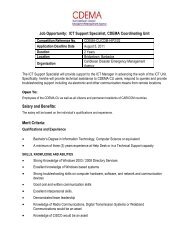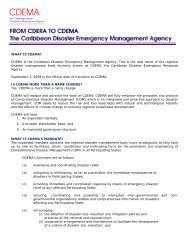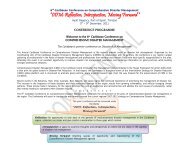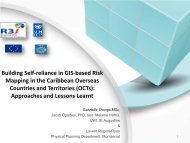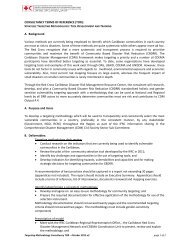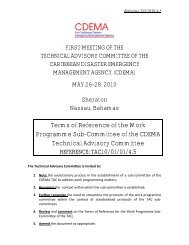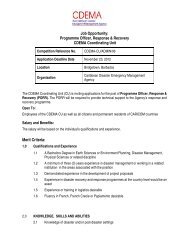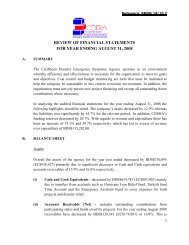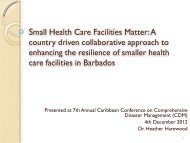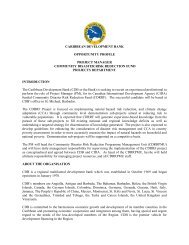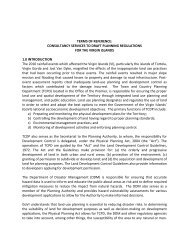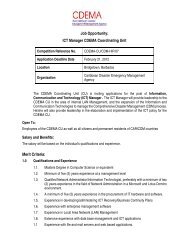Create successful ePaper yourself
Turn your PDF publications into a flip-book with our unique Google optimized e-Paper software.
1. Project background and description<br />
1.1. Project background<br />
Global Climate Change is the most serious threat to sustainable development facing <strong>CDEMA</strong> Participating<br />
States. The limited adaptive capacity of Caribbean small-island and low-lying states, in addition to rising sea<br />
levels, an escalation in the frequency and intensity of tropical storms and hurricanes, and disruptions in rainfall<br />
and fresh-water supply, requires urgent action for the preservation of their very existence.<br />
In an effort to strengthen regional, national and community level capacity to mitigate and respond to the effects<br />
of climate change, the Austrian Development Agency (ADA) is providing support to the Caribbean Disaster<br />
Emergency Management Agency (<strong>CDEMA</strong>) for the execution of the “Mainstreaming Climate Change into<br />
Disaster Risk Management for the Caribbean Region (CCDM) Project”.<br />
Specifically, this two year project supports Comprehensive Disaster Management (CDM) Outcome 4 :<br />
Enhanced Community Resilience in <strong>CDEMA</strong> Participating States to Mitigate, Respond to and Recover from the<br />
Adverse Effects of Climate Variability and Change and Disasters and Key Result Area (KRA) 3 of the <strong>CDEMA</strong><br />
Work Programme: Capacity of Participating States Enhanced. Specifically KRA 3.3: Communities are more<br />
aware and knowledgeable on disaster management and related procedures including safer building techniques<br />
and KRA 3.3.1 Prevention, preparedness and response/ mitigation in communities is enhanced.<br />
The project seeks to achieve three outcomes:<br />
1) Improved coordination and collaboration between community disaster organisations and other<br />
research/data partners, including climate change entities, for undertaking comprehensive disaster risk<br />
management;<br />
2) Enhanced community awareness and knowledge on disaster management and climate change<br />
procedures; and<br />
3) Enhanced preparedness and response capacity (technical and managerial) for sub-regional and local<br />
level management and response.<br />
1.2. Description of sub-project under this consultancy<br />
For the achievement of Outcome 2 of the project, it is intended that community awareness and knowledge on<br />
climate change and its linkages to disaster risk reduction be enhanced through the development of a Model<br />
Community-based Climate Change Disaster Risk Reduction (MCCCDRR) Programme and a Regional<br />
Mechanism for the coordination of community-based disaster management initiatives.<br />
The MCCCDRR Programme forms the focus of this consultancy and will outline, in a document referred to<br />
here as the MCCCDRR Programme framework, a comprehensive approach to mainstreaming climate change<br />
into community-based disaster risk reduction initiatives. The specific deliverables under this sub-project<br />
consultancy are:<br />
a) <strong>Inception</strong> report<br />
b) the MCCCDRR Programme framework;<br />
c) a Model Community-based Climate Change and Disaster Risk Reduction Plan;<br />
d) a Module on Climate Change Adaptation (CCA) for communities, for inclusion in the revised version of<br />
<strong>CDEMA</strong>’s Community Disaster Preparedness Training Manual;<br />
e) Trainer’s 1 and Participant’s Handbooks to accompany the CCA Module for communities;<br />
1 CANARI recommends that this be re‐named ‘Facilitator’s Handbook’ to more clearly reflect the role that those using the Manual<br />
will be expected to play<br />
1



